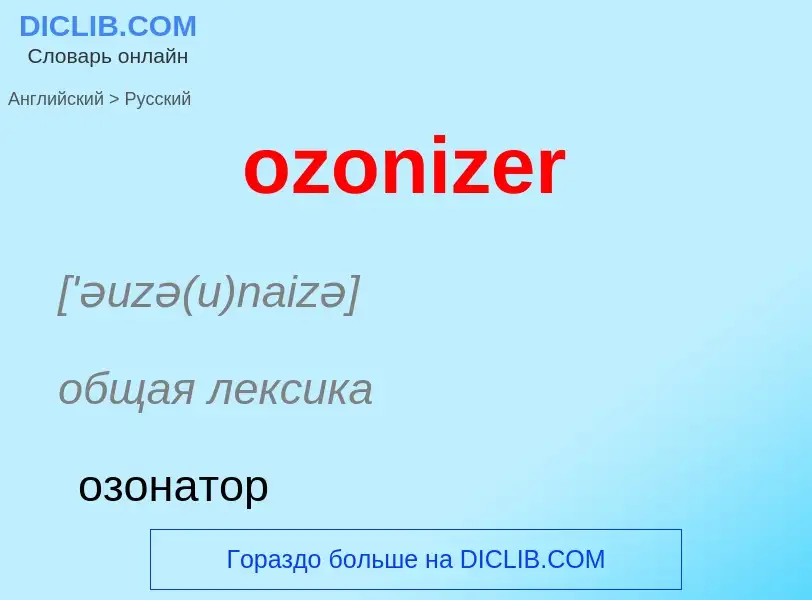Traduzione e analisi delle parole tramite l'intelligenza artificiale ChatGPT
In questa pagina puoi ottenere un'analisi dettagliata di una parola o frase, prodotta utilizzando la migliore tecnologia di intelligenza artificiale fino ad oggi:
- come viene usata la parola
- frequenza di utilizzo
- è usato più spesso nel discorso orale o scritto
- opzioni di traduzione delle parole
- esempi di utilizzo (varie frasi con traduzione)
- etimologia
ozonizer - traduzione in russo
['əuzə(u)naizə]
общая лексика
озонатор
существительное
общая лексика
озонатор
Definizione
Wikipedia

Ozone () (or trioxygen) is an inorganic molecule with the chemical formula O
3. It is a pale blue gas with a distinctively pungent smell. It is an allotrope of oxygen that is much less stable than the diatomic allotrope O
2, breaking down in the lower atmosphere to O
2 (dioxygen). Ozone is formed from dioxygen by the action of ultraviolet (UV) light and electrical discharges within the Earth's atmosphere. It is present in very low concentrations throughout the latter, with its highest concentration high in the ozone layer of the stratosphere, which absorbs most of the Sun's ultraviolet (UV) radiation.
Ozone's odour is reminiscent of chlorine, and detectable by many people at concentrations of as little as 0.1 ppm in air. Ozone's O3 structure was determined in 1865. The molecule was later proven to have a bent structure and to be weakly diamagnetic. In standard conditions, ozone is a pale blue gas that condenses at cryogenic temperatures to a dark blue liquid and finally a violet-black solid. Ozone's instability with regard to more common dioxygen is such that both concentrated gas and liquid ozone may decompose explosively at elevated temperatures, physical shock, or fast warming to the boiling point. It is therefore used commercially only in low concentrations.
Ozone is a powerful oxidant (far more so than dioxygen) and has many industrial and consumer applications related to oxidation. This same high oxidizing potential, however, causes ozone to damage mucous and respiratory tissues in animals, and also tissues in plants, above concentrations of about 0.1 ppm. While this makes ozone a potent respiratory hazard and pollutant near ground level, a higher concentration in the ozone layer (from two to eight ppm) is beneficial, preventing damaging UV light from reaching the Earth's surface.




![Nimbus-7]] satellite Nimbus-7]] satellite](https://commons.wikimedia.org/wiki/Special:FilePath/Nimbus ozone Brewer-Dobson circulation.jpg?width=200)

![Ozone cracking in [[natural rubber]] tubing Ozone cracking in [[natural rubber]] tubing](https://commons.wikimedia.org/wiki/Special:FilePath/Ozone cracks in tube1.jpg?width=200)

![[[Christian Friedrich Schönbein]] (18 October 1799 – 29 August 1868) [[Christian Friedrich Schönbein]] (18 October 1799 – 29 August 1868)](https://commons.wikimedia.org/wiki/Special:FilePath/Schönbein.jpg?width=200)


.jpg?width=200)

